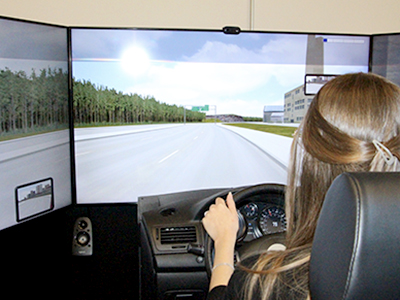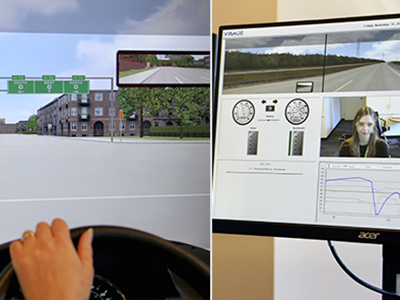
New study from the Road Safety and Public Health Research lab assesses driving performance among medical residents after long overnight shifts.
Welcome to "Behind the Lab Doors," an exclusive Research Insider series that offers a behind-the-scenes glimpse into the labs of health researchers across VCHRI. These stories will explore research currently in the works, including ongoing and long-term studies that have the potential to directly impact quality of care for patients and clinicians. To feature a study from your VCHRI-affiliated lab, contact us at vchricommunications@vch.ca.
Similar to driving while under the influence of drugs or alcohol, falling asleep at the wheel can have lethal consequences. In Canada, it is estimated that 20 per cent of fatal road collisions involve a fatigued driver. In British Columbia alone, an average of 72 per cent of 850 fatigue-related crashes result in injury each year.
Drowsy driving is also a common occurrence among hospital staff, who are frequently subjected to long hours and shift work. A recent survey of graduates of the Emergency Medicine Residency Program at the University of British Columbia (UBC) found that nearly half of trainees reported having some sort of motor vehicle accident in the previous year.
To address this ongoing issue, Vancouver Coastal Health Research Institute (VCHRI) scientist Dr. Jeff Brubacher is conducting research that may help provide solutions to mitigate potentially dangerous post-shift driving performance among medical residents using a state-of-the-art driving simulator.

Brubacher and his Road Safety and Public Health Research team developed the Sleepy Driving Simulator Study as an addition to their ongoing observational research around drug-impaired driving.
“We thought a driving simulator would really complement the research that we have been doing involving cannabis and driving,” says Brubacher. “Using a simulator creates a controlled setting where we can examine fine details of driving performance and safely assess a driver’s ability to avoid collisions.”
“Data gathered from this study could be used to develop guidelines for improved on-call hours, safe options for travelling home from work and opportunities to rest before driving home after work.”
Testing high-risk scenarios at no risk

The simulator is programmed to include multiple collision scenarios, a variety of roadway configurations, and different weather and traffic conditions. Not initially designed for research, the simulator was used as part of a pilot study led by Brubacher in June 2022, where the team developed a modified and optimized version for use in their driving simulation research.
The team’s current study involves medical trainees at nearby VGH who volunteer to participate in a preliminary practice session used to help them acclimate to the physical effects of the simulator. Participants are then tested twice more in simulated ‘high risk’ collision scenarios, either after a long night shift of 18 hours or more, or on a normal day when they are well rested.
“Our main objective is to compare the number of simulated collisions for residents who are in a sleep-deprived state with those who are in a rested state,” notes Brubacher.
(Video: Study coordinator Bianca Boicu demonstrates a collision scenario using the driving simulator.)
The study examines multiple measures while participants are ‘on the road,’ including their position within the lines marking a roadway lane, whether they drive over those lines, their reaction time, changes in their driving speed and number of collisions. Other driving variables that the team will be exploring include steering wheel position, time-to-collision and the distance between the participant’s vehicle and other simulated vehicles on the road.
“We are very interested to see if there is a change in cognition when participants are rested, and if that cognitive performance can statistically predict driving performance,” says research coordinator Bianca Boicu.

“This evidence could be used to establish workplace commuting recommendations for medical staff who work shifts or long hours to better ensure that they get home safe,” she says.

In terms of future simulation research, the team is currently in the planning stages of a supervised medical cannabis driving performance study. Brubacher has also identified additional opportunities for collaboration across health research disciplines, including potential partnerships with neuropsychologists and psychiatrists at the Djavad Mowafaghian Centre for Brain Health to further evaluate the effects of cognitive testing in relation to driving performance.
“Ultimately, we hope that these types of studies will help us identify measures to improve driving performance,” he says.


